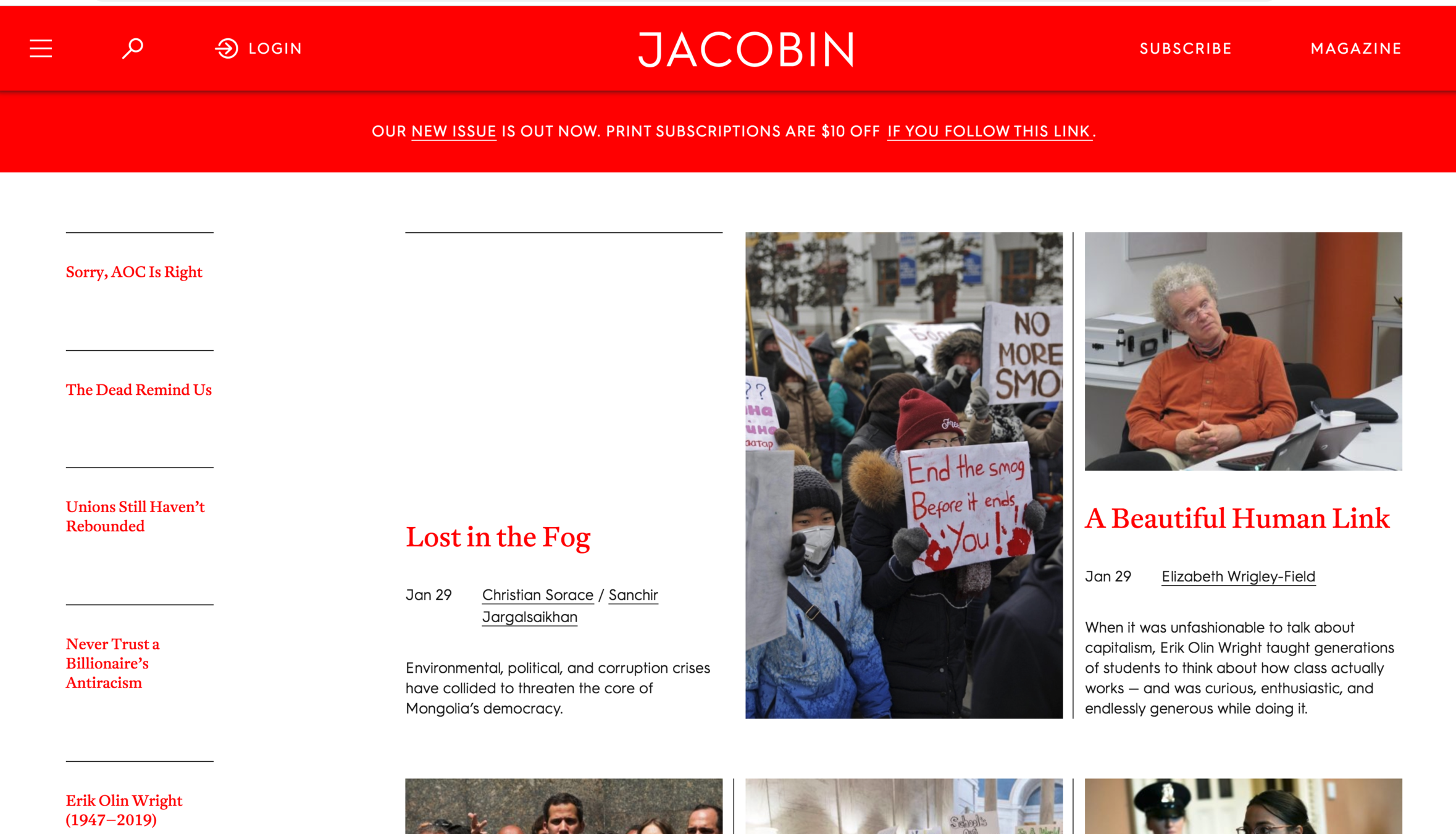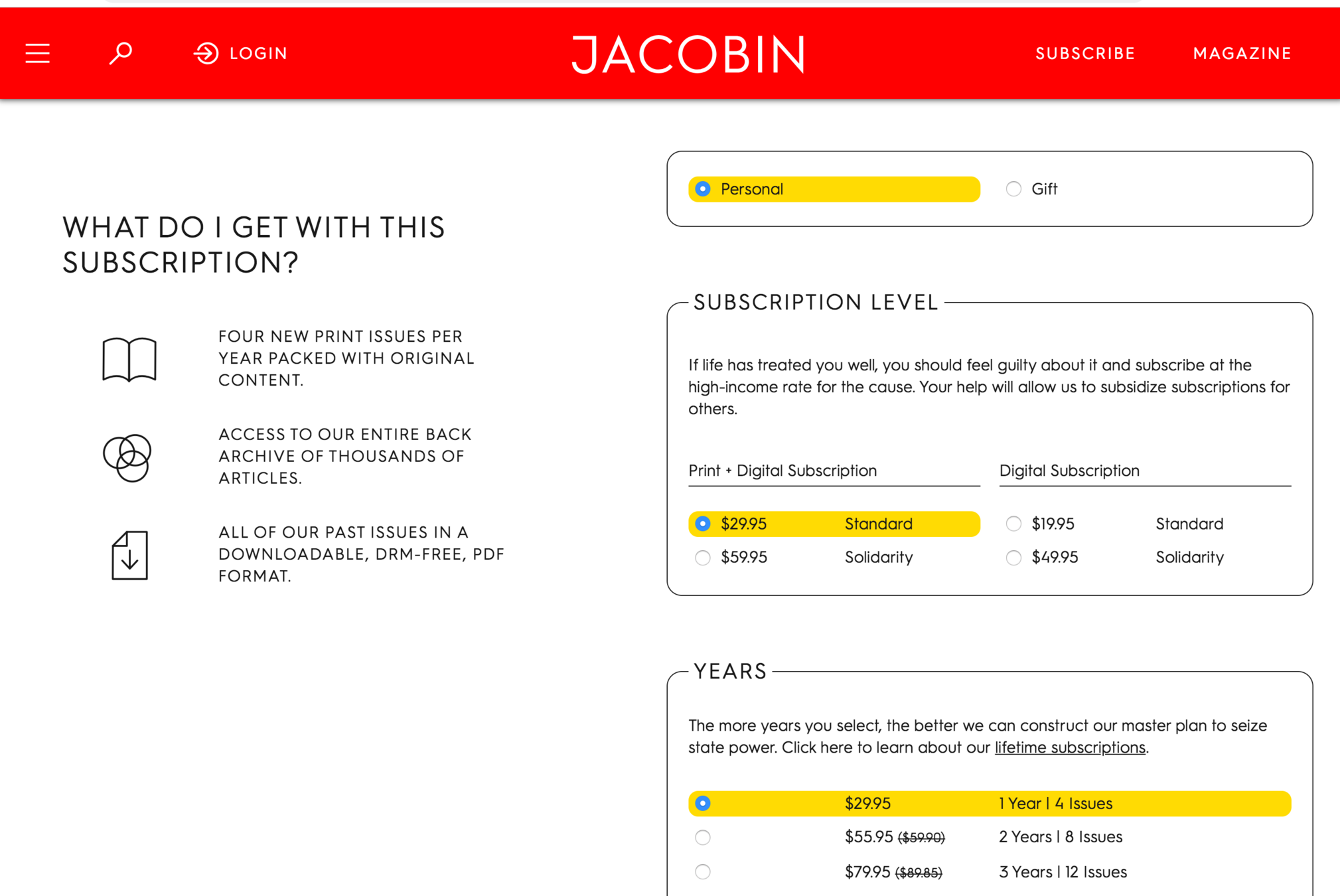Maintaining a legacy Haskell app
as a junior developer
https://slides.com/emhoracek/haskell-24/live
1. A project
2. How we did it
3. Challenges
4. Strategies that helped
What I'm going to talk about
Background
- When I joined in 2015, Haskell was small % of work
- When Daniel Patterson left in 2016, he handed the Haskell projects off to me
- Most were dormant, but Jacobin Magazine had one project coming up
Jacobin "Redesign"
Before
WordPress with Haskell app embedded in iFrames
Haskell app
WordPress
Haskell app
Goals
- WordPress is just for editors and writers (not readers)
- Posts/articles are structured, with different types of posts structured in different ways
- All pages use the same template and style language
- Mobile-friendly and responsive
Haskell app serves content from WordPress API
Jacobin "Redesign"
After
Haskell app
WordPress
How we did it
https://slides.com/emhoracek/haskell/live
WordPress
- WP REST API
- Advanced Custom Fields
"acf": {
"internal_memo": "",
"sections": [
{
"acf_fc_layout": "standard",
"title": "(section title)",
"featured_media": false,
"section": [
{
"content": "(section content)"
}
]
}
],
"paywall": false,
"toc": false,
"subhead": "(subhead)",
"antescript": "",
"postscript": "",
"footnotes": ""
/* and many more */
}Offset templates
<wpPostByPermalink>
<apply template="_post">
<wpMultisection>
<wpSections>
<wpSection>
<section class="po-cn__section po-wp__section" id="ch-${wpSectionsIndex}">
<if exists="${wpTitle}">
<then><h1 class="po-cn__subhead po-wp__subhead"><wpTitle/></h1></then>
<else><hr class="po-cn__rule po-wp__rule"/></else>
</if>
<wpContent/>
</section>
</wpSection>
</wpSections>
</wpMultisection>
</apply>
</wpPostByPermalink>Custom Fields with Offset
multiSectionFields :: Field Ctxt
multiSectionFields = CN "multisection"
["acf"]
[ M "sections"
[ F "title"
, M "section"
[ F "content" ] ] ]data Field s = F Text -- A single flat text or number field
| P Text (Text -> Fill s) -- A custom-parsed flat field
| N Text [Field s] -- A nested object field
| C Text [Text] -- A text field found by following the specified path
| CN Text [Text] [Field s] -- Combination of `C` and `N`
| M Text [Field s] -- A list field, where each element is an objectCustom Fields with Offset
data Field s = F Text -- A single flat text or number field
| N Text [Field s] -- A nested object field
| C Text [Text] -- A nested text field found by following the specified path
| CN Text [Text] [Field s] -- Combination of `C` and `N`
| M Text [Field s] -- A list field, where each element is an object
| P Text (Text -> Fill s) -- A custom-parsed flat text field
| B Text -- A single flat boolean field
| CB Text [Text] -- Combination of `C` and `B`
| PV Text (Maybe Value -> Fill s) -- A custom-parsed value field
| PN Text (Object -> Fill s) -- A custom-parsed nested field
| PM Text ([Object] -> Fill s) -- A custom-parsed list field
| Q Text IdToEndpoint -- A field that will make another request
| QM Text IdsToEndpoint -- A list of fields that will make another requestThe end result



Challenges
https://slides.com/emhoracek/haskell-24/live



The Genius-Oh-No Cycle




"I have no idea what I'm doing"
- Me: Working on a team with front-end developers
- David: Working with this weird templating language

Me: "How have your teams handled stuff like this?"
David: "The templating languages are more flexible than Larceny, and the frameworks make it easier to expose more data."
Me: "Oh. We can do that."
David: "We can?!"


We write wpCustom, which allows Remeike to query any endpoint he wants and use any JSON from the response!
<wpCustom endpoint="wp/v2/posts/${wpId}">
<ul>
<wpTags>
<li><a href="/tag/${wpSlug}"><wpName/></a></li>
</wpTags>
</ul>
</wpCustom> { id: 43453,
/* ...lots of other fields... */
tags: [
{ name: "Sports", slug: "sports"
name: "Bookmarx", slug: "bookmarx" }
]
}A few weeks later,
a wpCustom template
crashes the entire site.

The Genius-Oh-No Cycle




Chesterton's Fence



https://slides.com/emhoracek/haskell-24/live

According to my research the fence was built as an art project and abandoned in 1975!
THERE WAS A RAMPAGING BULL BEHIND THE FENCE
idk what if it's important?????
who knows????
I'll research the historical owners of the surrounding property.
What is the difference between
"this is bad"
and
"I don't understand this"?
Stereotype threat



https://slides.com/emhoracek/haskell-24/live

Things that helped
https://slides.com/emhoracek/haskell-24/live
Pair programming
Test-driven development
The TDD Cycle




Green
Red
Refactor
Reflect
RFCs
For companies:
Can't find a person with extensive production experience developing FP web applications? Try:
a person with knowledge of FP
plus
a person with experience in web applications
It works!
Finally
- I work at Position Dev
- positiondev.com / @positiondev
- Twitter: @horrorcheck
- Slides: slides.com/emhoracek/haskell/live
- Offset: github.com/positiondev/offset
- Larceny: github.com/positiondev/larceny
- THANKS: David Hartunian, Daniel Patterson, Remeike Forbes, Pea Lutz, Bhaskar Sunkara
abstractions
By emhoracek
abstractions
- 1,687



